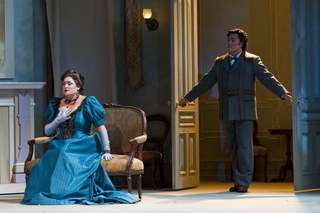|
Back
Vanessa, we hardly know you Sarasota
Sarasota Opera
03/10/2012 - & March 13, 15, 18, 21, 24, 2012
Samuel Barber: Vanessa
Kara Shay Thomson (Vanessa), Audrey Babcock (Erika), Cindy Sadler (Baroness), Scott Piper (Anatol), Thomas Potter (Doctor)
Sarasota Opera Orchestra and Chorus, Roger L. Bingaman (chorus master), David Neely (conductor)
Michael Unger (director), Michael Schweikardt (scenic design), Howard Tsvi Kaplan (costume design), Ken Yunker (lighting design)

K. S. Thomson, S. Piller (© R. Millington)
By offering Samuel Barberís Vanessa Sarasota Opera has done a great service. Vanessa is an opera so often talked about when people discuss the finest of American musical works. Yet it is offered so rarely that most of us only know it by recording. There are some people who really love it, but almost always they are musicians and singers. Audiences have never responded with as much enthusiasm. So to actually have the opportunity to see and hear it in performance, not merely in a concert production, allows us to decide whether or not it actually works as a piece of musical theatre.
It might be helpful to those experiencing Vanessa for the first time to understand that the opera really concerns the journey of her ďniece,Ē Erika. Without this knowledge, I would have been very confused trying to find a reason for taking seriously anyone as shallow and unlikeable as Baroness Vanessa. In this production, when Vanessa sits to say goodbye to one of her servants, it is easy to see her as a diva giving attention to a fan. But at the same time, this makes her one of operalandís most fascinating characters.
It is amazing to think that non-American critics found Vanessa old-fashioned because the composer didnít take the lead of so much modern opera in the first half of the 20th century. Thankfully Samuel Barber ignored them and didnít hesitate giving us melody. The orchestration is lush even in its dissonance.
The libretto is not unlike a Gothic romance, even a bit like a horror story since it appears that all the characters will have very unhappy futures; a gripping and original story with so many questions purposely left unanswered. It is a mystery that this opera didnít remain the hit it created at its premiere.
Sarasota Opera has given Vanessa a sumptuous yet not overblown physical production. The sets, mainly in shades of grey and white give a perfect frame for the strong colors of the costumes. Many different moods are emphasized with bold lighting designs, the most impressive of which comes with Anatolís first entrance.
It is rare when a performance has only rock solid lead performances. The Old Baroness is a small role vocally yet she has a lot of stage time in which her temperament remains one of quiet disgust. Yet Cindy Sadler is such a fine actress that there are moments when this mean old woman becomes almost vulnerable. Sadlerís rich low mezzo is penetrating and her contribution to the quintet is especially pronounced. Thomas Potter uses his huge voice to offer some much needed comic relief yet he also creates a touching old man who has lost his dignity. And just why will the Old Baroness not talk to him either? Scott Piperís Anatol is vocally perfect and because this character makes his self-serving motives so clear, it is hard to dislike him for duping the aware yet weak-willed Vanessa. Erika is the character who has our deepest sympathy and interest. Unlike her ďaunt,Ē she is smart, kind and selfless. Audrey Babcockís clean, youthful mezzo works perfectly for Erikaís many strengths, yet also expresses a warm feminity. Her ďMust the winter come so soon,Ē has an almost proud sadness. Kara Shay Thomsonís Vanessa sensibly appears vocally and physically about the same age as Erika. It is easy to feel that Vanessa has figuratively sucked the life out of her ďniece.Ē Thomson, a strikingly beautiful woman with a youthful sounding soprano, has exactly what Vanessa must to become a female Dorian Gray. Vanessa is a role with a very high tessitura and Thomson with her spot on diction, does the near impossible by rendering useless, except in a few places, the supertitles.
This score requires a commanding orchestra to make the fourth act intermezzo as haunting as any of the singerís vocal lines. Conductor David Neely understands just how nuanced this score is and never overpowers us as is sometimes the case with the famous original cast recording which could have been hampered by the technological limits of 1958. Roger L. Bingamanís chorus offers a quietly haunting reverie with the offstage church choir near the second actís conclusion. Michael Ungerís fluid direction encourages us to contemplate the many ambiguities of Menottiís text. It is hard to imagine that Menotti wasnít honored by all the questions audiences must have had and he probably also had fun telling them that he couldnít offer answers better than their own.
Letís hope that this magnificent production encourages the opera world to rediscover a work that is like no other.
Jeff Haller
|